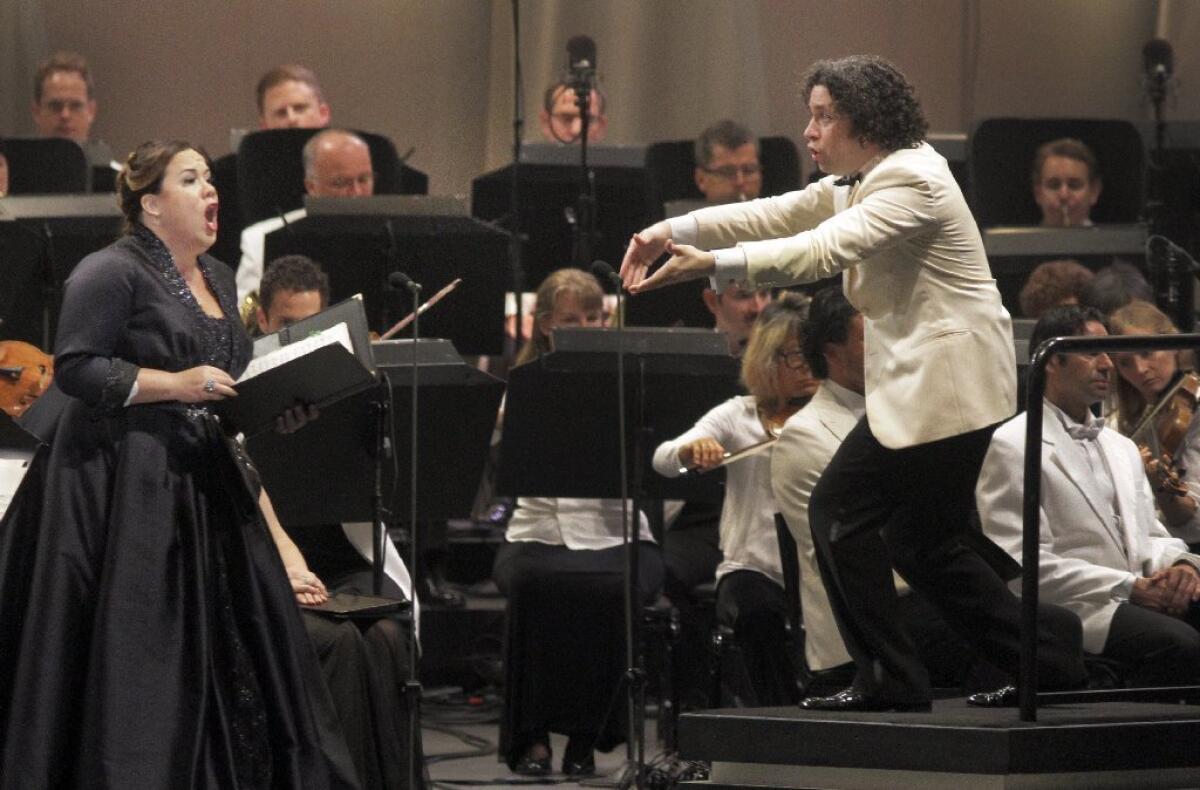Critic’s Pick: Dudamel conducts ‘Cav’ and ‘Pag’ at the Hollywood Bowl

- Share via
When Cornell musicologist Donald Jay Grout wrote his 850-page “A Short History of Opera” in 1947, the textbook, which introduced generations of undergraduate music students to opera, made short shrift of Pietro Mascagni’s “Cavalleria Rusticana” and Ruggiero Leoncavallo’s “Pagliacci.”
But the two one-act operas -- which are commonly joined on a double bill, as they will be Sunday night at the Hollywood Bowl in Los Angeles Philharmonic performances conducted by Gustavo Dudamel -- cannot be ignored by history. Written respectively in 1880 and 1882, they ushered in what became known as verismo opera, opera based on realistic, everyday, melodramatic events.
Grout groused that Mascagni and Leoncavallo drowned out more reserved and aristocratic Italian music with “the bellow of verismo.”
“Verismo is to naturalism what the ‘shocker’ is to the realistic novel,” he wrote. And Grout gloated that just as these short operas about sexual infidelity and murder “burn out with a fierce and unnatural flame,” verismo, itself, was subject to rapid exhaustion.
Grout got that wrong. Shabby little shockers, as another musicologist called Puccini’s “Tosca,” were, and still are, here to stay. Much modern opera, particularly by Americans, is highly melodramatic and written in a style not that far removed from the sensationalist and lurid post-Wagnerian style of verismo. In addition, many modern productions go in for sensationalist and lurid stagings of refined and aristocratic operas by Mozart, Handel and many other composers.
Post-World War II Italian film directors like Roberto Rossellini turned verismo into a revolutionary new cinematic style. In fact, the Italians have never been able to escape “Cav” and “Pag.”
Around the time Grout produced the second edition of his textbook in the 1960s, Herbert von Karajan was invited to La Scala to conduct highly refined performances of the double bill, which he also filmed in a Rossellini style. Fellini’s clown obsession must have had some of its roots in the jealous clown of “Pagliacci.”
Since operas at the Bowl are unstaged, Dudamel will deliver “Cav” and “Pag” straight, with a cast that includes soprano Julianna Di Giacomo, tenor Stuart Neill and baritone Christopher Maltman. The conductor will be transitioning from a week of Beethoven to Latin American music in which he will be joined by Ruben Blades at the Bowl, and that is another way of saying anything goes.
More to Read
The biggest entertainment stories
Get our big stories about Hollywood, film, television, music, arts, culture and more right in your inbox as soon as they publish.
You may occasionally receive promotional content from the Los Angeles Times.











